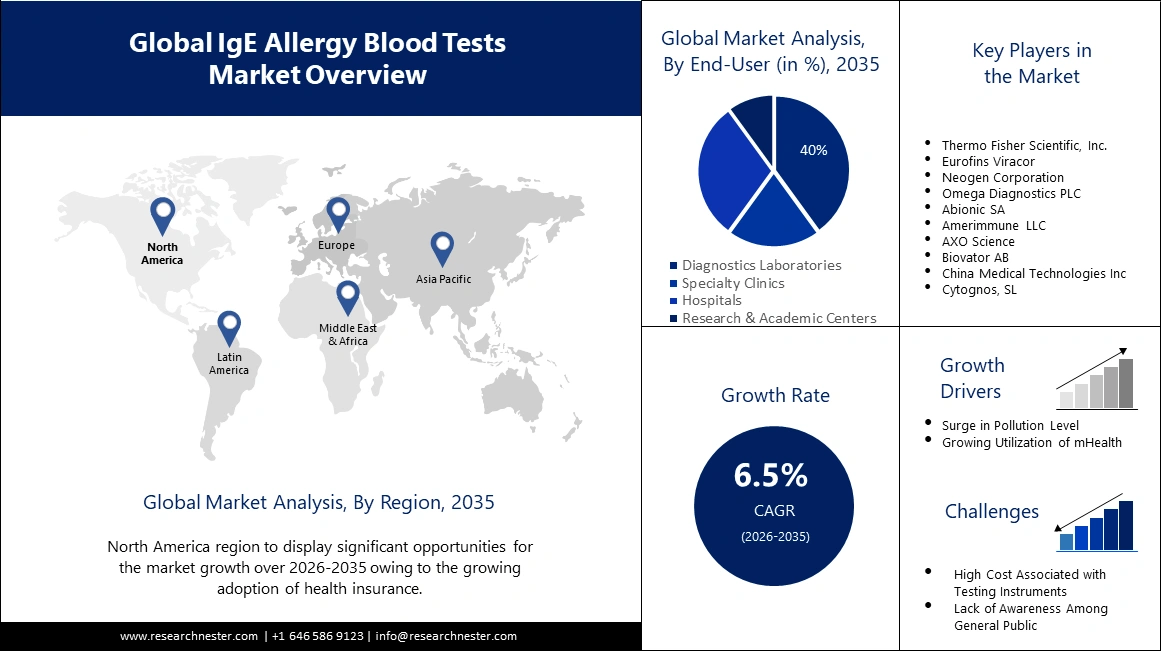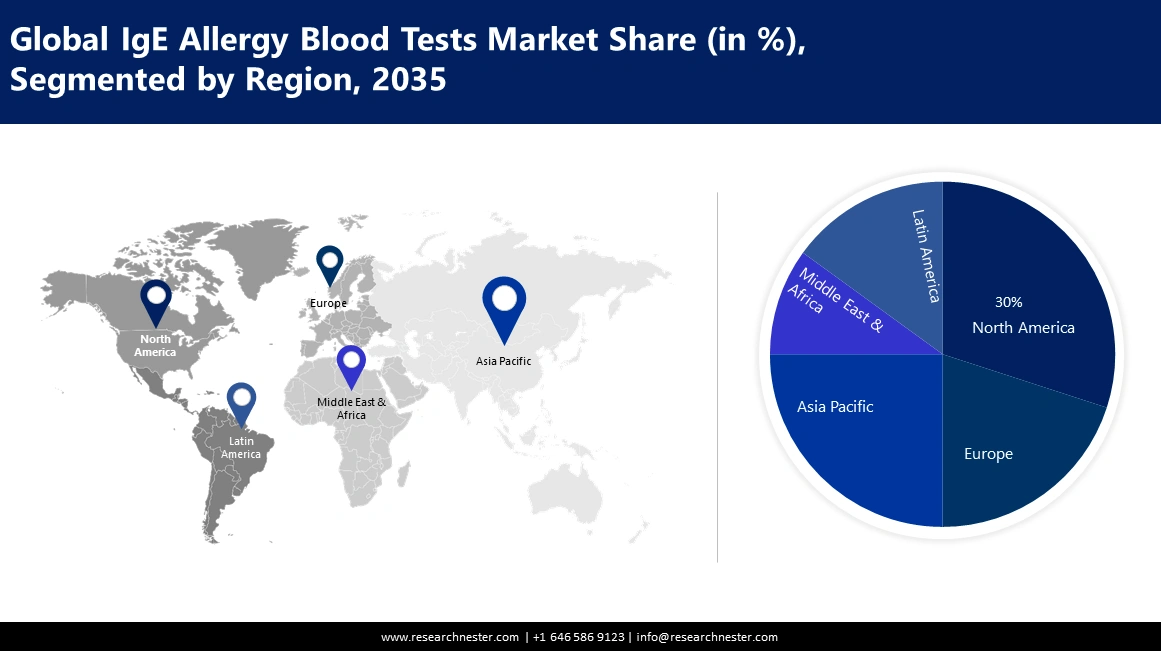IgE Allergy Blood Tests Market Outlook:
IgE Allergy Blood Tests Market size was over USD 34.19 billion in 2025 and is projected to reach USD 64.18 billion by 2035, growing at around 6.5% CAGR during the forecast period i.e., between 2026-2035. In the year 2026, the industry size of IgE allergy blood tests is evaluated at USD 36.19 billion.

The major factor influencing the market expansion is the rising prevalence of asthma. With a projected 262.41 million prevalent cases (95% UI 224.05 to 309.45) worldwide, the burden of asthma has continued to climb. Hence, the demand for IgE allergy blood tests is growing. Asthma sufferers undergoing allergy testing typically have their IgE levels checked for airborne allergens that are known to frequently impact their symptoms.
Additionally, there has been growing awareness regarding the prevalence of allergies all across the globe by the government. They are launching various campaigns where they are offering free testing for allergies. This is why, the IgE allergy blood tests market is observing the growth in its revenue.
Key IgE Allergy Blood Tests Market Insights Summary:
Regional Highlights:
- North America igE allergy blood tests market will hold more than 30% share by 2035, driven by growing adoption of health insurance and advanced testing instruments.
Segment Insights:
- The diagnostics laboratories segment in the ige allergy blood tests market is forecasted to achieve a 40% share by 2035, driven by the essential role of diagnostic labs in allergy diagnosis and availability of advanced technology.
- The food allergies segment in the ige allergy blood tests market is anticipated to hold a 30% share by 2035, attributed to the rising prevalence of food allergies linked to vitamin D deficiency globally.
Key Growth Trends:
- Surge in Pollution Level
- Growing Utilization of mHealth
Major Challenges:
- High Cost Associated with Testing Instruments
- Lack of Awareness Among the General Public
Key Players: Thermo Fisher Scientific Inc., Siemens Healthineers AG, Hycor Biomedical, LLC, Euroimmun AG (PerkinElmer), Quest Diagnostics Incorporated, LabCorp (Laboratory Corporation of America Holdings), Bio-Rad Laboratories, Inc., GenWay Biotech, Inc., Alere Inc. (Abbott), Stallergenes Greer.
Global IgE Allergy Blood Tests Market Forecast and Regional Outlook:
Market Size & Growth Projections:
- 2025 Market Size: USD 34.19 billion
- 2026 Market Size: USD 36.19 billion
- Projected Market Size: USD 64.18 billion by 2035
- Growth Forecasts: 6.5% CAGR (2026-2035)
Key Regional Dynamics:
- Largest Region: North America (30% Share by 2035)
- Fastest Growing Region: Asia Pacific
- Dominating Countries: United States, Germany, United Kingdom, Japan, China
- Emerging Countries: China, India, Japan, South Korea, Singapore
Last updated on : 16 September, 2025
IgE Allergy Blood Tests Market Growth Drivers and Challenges:
Growth Drivers
- Surge in Pollution Level - According to WHO data, practically all people on the globe (99%) inhale air that is polluted to high levels and exceeds WHO guideline limits; low- and middle-income countries are particularly exposed. Furthermore, 2.4 billion people use polluting open fireplaces or basic stoves powered by coal, kerosene, biomass (wood, animal dung, and agricultural waste), and various other household pollutants, subjecting them to dangerously high levels of air pollution at home. This has further increased the prevalence of allergies. There is a stronger correlation between air pollution and a higher incidence of allergies. A higher concentration of proteins classified as allergenic can be found in pollen in areas with high pollution levels. By getting into physical touch with the pollen particles, DEPs can disrupt the latter. This may result in the release of paucimicronic particles, which then travel by air and have an easier time entering human airways hence further causing allergies.
- Growing Utilization of mHealth - Through online marketplaces including Google Play for Android devices and Apple's "App Store" for iOS devices (iPhone, iPad), a vast array of programmes are offered to the general public. Apps have grown more and more popular among patients and healthcare professionals as they are simple to utilize. It has been demonstrated that mHealth apps improve patient-centered outcomes, and physicians frequently recommend apps to their patients. Apps benefit patients of various ages and levels of education due to their diverse feature sets, which include action plans, games, educational content, diaries, and reminders. mHealth apps may remind users to take their prescriptions by sending automated scheduled reminders every day or several times a day. Research has demonstrated that SMS medication reminders for particular chronic illnesses, including asthma, have greatly increased treatment adherence rates across all age groups. Hence, with the growing adoption of mHealth the IgE allergy blood tests market is growing.
- Rising Prevalence of Food Allergies - To identify and treat food allergies more effectively, allergen-specific IgE testing is occasionally utilized. Some individuals who are prone to food allergies develop antibodies against specific foods since their immune systems erroneously see them as foreign invaders. For example, people opts for gluten-free food, as they are gluten intolerant. IgE antibodies are the sort of antibodies that are generated. These are distinct from IgG antibodies, which are critical in the defense against viruses and bacteria. For determining if a person is allergic to a food, allergen-specific IgE testing can identify elevated levels of food-specific IgE.
Challenges
- High Cost Associated with Testing Instruments - Market participants frequently update an array of allergy diagnostic tools, including luminometers, blot analyzers, scanners, ELISA analyzers, and immunoassay analyzers. The aforementioned instruments are more expensive since they have more features and functionalities (the cost of each instrument varies depending on its accuracy, versatility, and TAT). In addition, extra expenses for operating this technology include overhead (such as electricity, space, and administration), laboratory supervision, maintenance, and insurance. Large hospitals and testing facilities hold a larger IgE allergy blood tests market share because they can afford high-volume systems because of their robust capital budgets. However, because of financial limitations, the majority of small labs, doctor's offices, and independent practitioners are typically unable to purchase huge or extremely large systems.
- Lack of Awareness Among the General Public
- Lack of Professionals to Handle the Instruments
IgE Allergy Blood Tests Market Size and Forecast:
| Report Attribute | Details |
|---|---|
|
Base Year |
2025 |
|
Forecast Period |
2026-2035 |
|
CAGR |
6.5% |
|
Base Year Market Size (2025) |
USD 34.19 billion |
|
Forecast Year Market Size (2035) |
USD 64.18 billion |
|
Regional Scope |
|
IgE Allergy Blood Tests Market Segmentation:
End-User Segment Analysis
The diagnostics laboratories segment in the IgE allergy blood tests market is estimated to gather the highest share of over 40% during the forecast period. Diagnostic lab services are essential to the healthcare industry since they are vital to the diagnosis and management of diseases. Furthermore, a clear role for the diagnostics laboratory exists in the diagnosis and treatment of allergy sufferers. Furthermore, diagnostics laboratories have a huge availability of funds and the latest technology as compared to hospitals. In the past, when diagnostic testing services were less developed, medical professionals relied on a patient's symptoms to determine what was allegedly wrong and recommend medication. Frequently, the patient's symptoms were ambiguous, and the wrong problem was being addressed. However, this is no longer an issue as a result of developments in technology and medicine. Diagnostic centers today offer several examinations for allergies. As a result, the preference for diagnostics laboratories is growing.
Application Segment Analysis
The food allergies segment is expected to hold 30% share of the global IgE allergy blood tests market during the forecast period. In addition to being obtained through food, vitamin D is produced by the human body when exposed to sunshine. Due in large part to the immune system's regulation by vitamin D, the prevalence of food allergies has risen as vitamin D levels have decreased between nations. According to study data, 50% of the global population suffers from vitamin D insufficiency, while approximately 1 billion people worldwide suffer from vitamin D deficiency.
Our in-depth analysis of the global IgE allergy blood tests market includes the following segments:
|
Product Type |
|
|
Application |
|
|
End-User |
|

Vishnu Nair
Head - Global Business DevelopmentCustomize this report to your requirements — connect with our consultant for personalized insights and options.
IgE Allergy Blood Tests Market Regional Analysis:
North American Market Insights
The North America industry is estimated to account for largest revenue share of 30% by 2035. The major element to influence the market expansion is the growing adoption of health insurance. In 2022, more individuals had insurance than in 2021. Moreover, 2022 saw a rise in the proportion of the population with health insurance from 91.7 percent in 2021 to 92.1 percent in 2022 in the US, or 304.0 million individuals, who were insured at some point in the year. Furthermore, for public as well as private sector employees, purchasing a health insurance policy has been made mandatory in various organizations in this region. Key medical benefits are given by health insurance, which employees can use when employed by a business. Health insurance coverage is very helpful in covering treatment costs in the event of an emergency or other medical problem. Additionally, there has been a rise in the development of various instruments by key players for more advanced testing which is also estimated to boost the IgE allergy blood tests market expansion in this region.
APAC Market Insights
The IgE allergy blood tests market in Asia Pacific is also estimated to have notable growth during the coming years. The market in this region is expanding owing to the increased attention being paid to personalized medication and the expanding knowledge of allergic disorders. The IgE allergy blood tests market growth potential in this region is further enhanced by the incorporation of these tests into standard healthcare regimens.

IgE Allergy Blood Tests Market Players:
- Thermo Fisher Scientific, Inc.
- Company Overview
- Business Strategy
- Key Product Offerings
- Financial Performance
- Key Performance Indicators
- Risk Analysis
- Recent Development
- Regional Presence
- SWOT Analysis
- Eurofins Viracor
- Neogen Corporation
- Omega Diagnostics PLC
- Abionic SA
- Amerimmune LLC
- AXO Science
- Biovator AB
- China Medical Technologies Inc
- Cytognos, SL
Recent Developments
- The U.S. Food & Drug Administration (FDA) has cleared Thermo Fisher Scientific's ImmunoCAP Specific IgE (sIgE) Allergen Components for use in in vitro diagnostic testing for wheat and sesame allergies. These cutting-edge blood tests, which are also anticipated to be made available countrywide, can serve as a diagnostic tool for physicians and other healthcare professionals by assisting in the identification of wheat and sesame allergies in patients who may experience a severe allergic reaction.
- Leading provider of immunology and infectious disease testing, Eurofins Viracor, officially opened its new, large laboratory in Lenexa, Kansas, today. With 215 current employees and 235 newly created roles, the 110,000 square foot, state-of-the-art facility will employ 450 people and provide additional capacity to support development in biopharma and transplant diagnostic testing services.
- Report ID: 5551
- Published Date: Sep 16, 2025
- Report Format: PDF, PPT
- Explore a preview of key market trends and insights
- Review sample data tables and segment breakdowns
- Experience the quality of our visual data representations
- Evaluate our report structure and research methodology
- Get a glimpse of competitive landscape analysis
- Understand how regional forecasts are presented
- Assess the depth of company profiling and benchmarking
- Preview how actionable insights can support your strategy
Explore real data and analysis
Frequently Asked Questions (FAQ)
IgE Allergy Blood Tests Market Report Scope
Free Sample includes current and historical market size, growth trends, regional charts & tables, company profiles, segment-wise forecasts, and more.
Connect with our Expert
Copyright @ 2026 Research Nester. All Rights Reserved.




